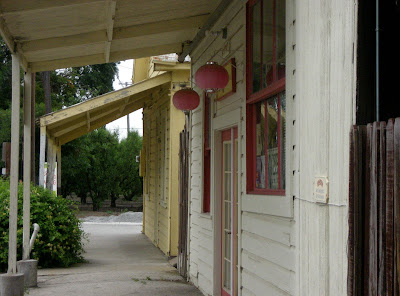Monday marked my (Jessica) first trip to the Sacramento Delta (Greer would like it noted she had been there once before). All I had ever heard about it is that it makes a great summer destination for boating. Thus I was surprised when the journey there turned out to be a trip back in time. In fact, much of the area looks as though it hasn't been touched since the 1920s.
A quick historical note about the area--in the late 19th century, Chinese workers were utilized to build levees throughout the waterways to prevent flooding in the surrounding farmland. This was a huge undertaking, as what was once marshland was engineered into 700 miles of controlled waterways.
We made our way through several Delta towns on the way to our ultimate destination of Locke, often noting striking resemblances to the banks of the Mississippi (well, what we imagine the banks of the Mississippi would look like, considering we have never been there). Now, please join us for our drive.
A quick historical note about the area--in the late 19th century, Chinese workers were utilized to build levees throughout the waterways to prevent flooding in the surrounding farmland. This was a huge undertaking, as what was once marshland was engineered into 700 miles of controlled waterways.
We made our way through several Delta towns on the way to our ultimate destination of Locke, often noting striking resemblances to the banks of the Mississippi (well, what we imagine the banks of the Mississippi would look like, considering we have never been there). Now, please join us for our drive.
Isleton, like many of the small Delta towns, was heavily inhabited by the Chinese in the late 1800s, and many traces of their influence remain. The town's main street, short though it is, remains fairly well preserved and retains a variety of old establishments, from Chinese restaurants to old West saloons. One can tell that it is well past its heyday, but in its heyday it thrived. It is now known for its Crawdad Festival!



Walnut Grove was established in 1850 and became a major shipping port and riverboat stop. Later small businesses and hotels sprang up and the small town became more commercial. Before WWII, the town was racially segregated with the river as the dividing line. The town was also famous for its illegal gambling.

Locke is a place with a very unique history--according to Locketown, "On August 2, 1970, Locke was added to the registry of national historical places, by the Sacramento County Historical Society, because of its unique status as the only town in the United States built exclusively by the Chinese for the Chinese." The town was created in 1916 after the Chinese neighborhood in Walnut Grove burned down in a fire. Most of the original buildings still stand--barely.

These buildings have the illusion of movement...



The former home of the Star Theater--you can still see the outline of the name over the door.

An interesting post on the community board in the middle of the street. If you have a minute, you should read it!









Historic photos: Isleton, Walnut Grove, Locke























4 comments:
Those buildings look so neat! You guys are really good at flying with dragons!
Jessica and Greer I love this blog! It's pretty much adorable of your guys. I love all the all pictures. I used to drive by Isleton all the time on my way to Stockton and I had no idea is was so historical and cute.
What a neat post! One of my favorites!
Thanks guys! Kerry--just so you know, the dragon flying took lots of practice...
Post a Comment